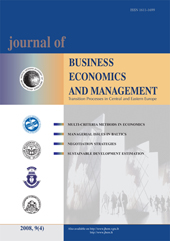The Overheating of Five EU New Member States and Cyclicality of Systemic Risk in the Banking Sector
The Overheating of Five EU New Member States and Cyclicality of Systemic Risk in the Banking Sector
Author(s): Alenka Kavkler, Sebastijan Repina, Mejra Festić Subject(s): Economy
Published by: Vilnius Gediminas Technical University
Keywords: cyclicality; non-performing loans; systemic risk; asset quality; economic growth
Summary/Abstract: Rapid credit growth has been one of the most pervasive developments in recent years in Central and Eastern Europe. We tested for the significance of macroeconomic and banking sector variables that condition non-performing loan ratios and the hypothesis of procyclicality between economic activity and improving banking-sector results in the Baltic States, Bulgaria and Romania. The theory of procyclicality between economic activity and the non-performing loan ratio was proven. The increased economic activity improved the loan portfolio quality of the banking sector, as indicated by a lower NPL ratio. Due to a high share of loans denominated in a foreign currency and the fact of productivity gains in the tradable sector, the appreciation of the real exchange rate contributed to an improvement in loan portfolio quality. The procyclicality of banking sector performance and high economic activities growth could be a signal of an economy overheating and therefore a slowdown in economic activity is likely to accelerate the growth of the non-performing loan ratio in the Baltic States, Bulgaria and Romania.
Journal: Journal of Business Economics and Management
- Issue Year: 2009
- Issue No: 3
- Page Range: 219-232
- Page Count: 14
- Language: English

